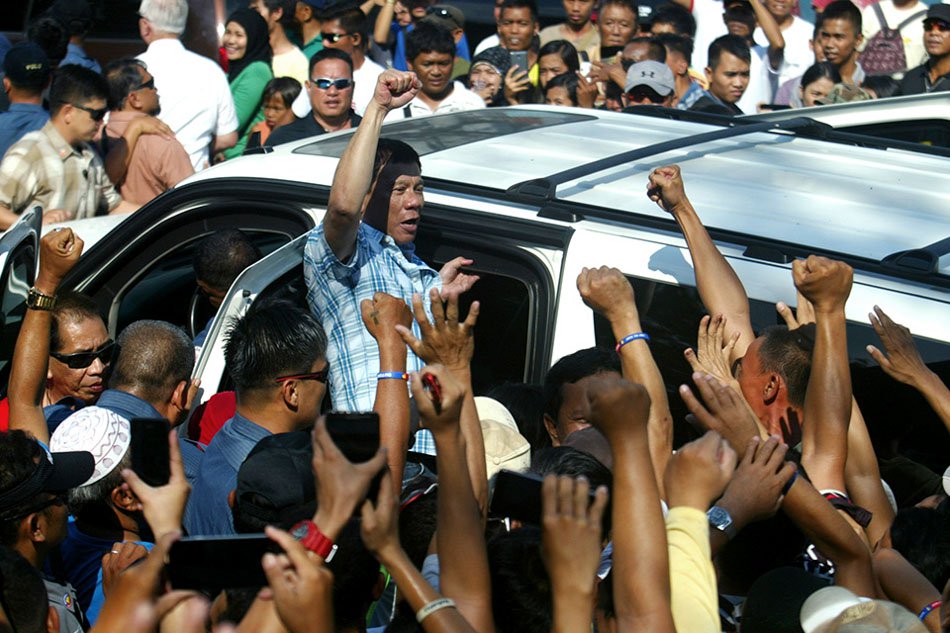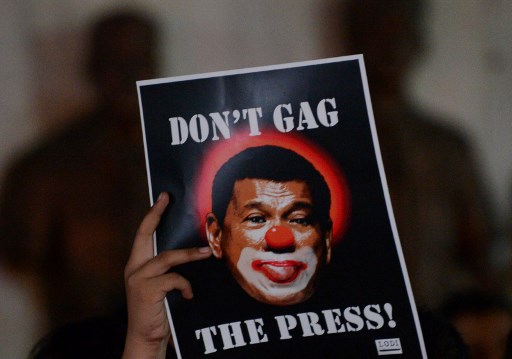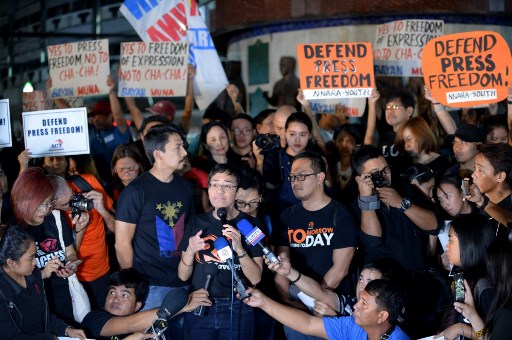It’s a rare and less-than-ideal situation for journalists when they become the story, but Rappler reporter Pia Ranada, one of the best-known reporters covering the president, found herself in the headlines after she was first banned from only entering Malacañang Palace, then banned from covering presidential events entirely. Ranada took heat from her critics, who said she was being rude and had “harassed” the Presidential Security Group guard. The young reporter, who has become the target of the president’s supporters and trolls alike, said she simply wanted answers. We talked to her about the day she wasn’t allowed into the palace, her relationship with the president, and dealing with national attention on social media.
Can you recount what happened the morning you were barred from entering the Palace?
I was going to Malacañang around 10:30. Enough for me time for me to prepare for the 11am presscon. So there, I took the train. From the train station, I took a tricycle, that’s gate two of Malacañang. Usually when you’re going on foot, you pass through the guard house, that’s where the PSG is. You have to show your ID.
Then I was told ‘ma’am, bawal kayo pumasok’ (You’re not allowed inside). I got scared. At first I thought it was just some heightened security measure.
So, I showed him my ID, and my Malacañang Press Corps ID. When he saw my name on it, he said, ‘ma’am, bawal talaga kayo pumasok’ (You really can’t go inside). That’s when I whipped out my smartphone.
No reason given?
None. I mean we’re told to document when this happens. I took a picture first. Then I tweeted that I’m being barred from Malacañang . I started asking questions with the camera.
I found out the order came from “up there” galing sa itaas (came from a higher up).
So if you didn’t ask the guard, would you have known where the order came from?
No. So then I asked him “kailan po binigay yung order?” (When was the order given?) Then he told me, “just this morning.”
Yung order na ito, para sa akin lang, or para sa mga ibang reporters din?
(These orders, are they just for me? Or for other reporters too?)
Sabi nya, “para sa inyo lang ma’am (he said, just for you ma’am).” That’s when I determined it’s just an order for Rappler/me.
Then, I also asked him if I could talk to someone higher up, because he seemed to not want to talk. So I said if you don’t want to talk, give me at least your boss or someone higher up, because at least I deserve to know what’s happening.
So eventually a second PSG [Presidential Security Group] personnel comes. Then [someone from the] PCOO [Presidential Communications and Operations Office] comes. She didn’t know about the order.
If they explained (from the beginning), I wouldn’t have had to question the guard, but he was my only source of information.
But the undersecretary sent her staff to me, so when the other PSG came, the staff from PCOO came over, they clarified the order came that stopped me from entering the palace itself, but at the time I could enter NEB (New Executive Building) so I was able to go in and asked about it during the press conference.
Were you surprised that some people later said you had been “harassing” the PSG guard?

I didn’t expect anyone to think I was bullying or harassing the guard. I was being my “media” self, someone who was determined to get answers. I didn’t shout at the PSG, I didn’t say bad words or threaten them. I asked if he could help me get in touch with someone higher up than him, right? But I knew the whole news bit of me being blocked from Malacañang, I knew that would blew up, because it kind of gives basis for people to think there are escalating ways the administration is silencing media or hindering them from covering the president.
In the weeks prior to this, did you feel any tension or hostility?
Yes, when the frigate story came out. The president watched the press conference where I was asking about it.
[Note: the “frigate story” refers to Rappler’s investigative story, written by reporter Carmela Fonbuena, which links Special Assistant to the President Bong Go to a PHP15 billion (US$288 million) frigate deal with the Philippine Navy. Read more here]

He had an event later that day, when he had the press conference where he berated me for that story. He ranted against Rappler, calling it fake news. That time, he was really angry. We could tell he was angry. He’s been angry at me before, but this was different.
READ: Duterte accuses Rappler of spreading ‘fake news’
[Special assistant to the president] Bong Go was messaging me too and he was angry. He was already being sarcastic with me.
Go was expecting we’d change our headline. He was angry about the word “intervenes.” He thought that when we got his side, we’d change our headline.
Based on your observation, how does the administration feel about the press and how they’re being covered?
[Duterte] doesn’t like press coverage that’s critical of him. Once you write something that hits close to home, or critical of him, he’ll find a way to let you know he’s angry.
That by itself has a chilling effect. That’s enough to scare some reporters from reporting a certain way. In that sense, I think he really is muzzling the press. No one can deny that. Even some of my colleagues (press corps and other media) admit that they can’t be seen supporting Rappler, they have to sometimes soften their headlines when it comes to the president.
How has the relationship between you and the president changed from your coverage of the campaign in 2016 until now?
I’d say more strained, definitely. Because when I was covering the campaign, [I covered] everything he said and did. In a way, that’s good for the campaign, because as long as you’re in the headlines or being written about, that’s good for the candidate. The president really thought we helped him, he even wrote me a thank you note and gave it to me during a dinner in Malacañang.

He was thanking me for helping him. I was probably the first Manila-based reporter who tagged along with him everywhere for election-related coverage, even before he declared his intention to run. He knows that, that I was there from the very beginning. So we had a certain warmth, because he knew me personally, I’ve met his family members, we’ve shared a drink together. I mean, you can’t help but really get to know someone when you’ve been covering them for more than a year.
But now, I think he feels it’s a betrayal, because I know have to write things that are hard hitting. It’s my job, every reporters job, to point out things that are wrong. I think he was shocked that I could do such a thing.
For reporters, it’s probably very rare that we find ourselves being the story. How has being part of the story for a couple of months now, and being constantly talked about and even harassed on social media, how has that affected your work and your personal life?
It’s really something I’m not used to. I’m more a writer than someone who goes on camera. Now, because I was interviewed on TV, people recognize me. It makes me nervous, like when I go grocery shopping, people recognize me and say hi to me.
Like, in a nice way?
That’s the thing, I don’t know. They just say “hi, Pia” and leave. For me, I don’t know if they’re putting up a front, or sincerely support me. I can’t afford to alienate people, so I just smile back. There are people who go out of their way to say they support me.
Does it get distracting? How do you deal with the attention?
I try to lay low when I go to a public place. I just try to do my job wherever I am. Since I can’t go to Malacañang now, what I do is watch his press conferences or speeches online or on TV, but I still call my sources in Malacañang to get background and more information.
Aside from trolling, have there been any serious threats to your life?
I don’t know because there are so many of them. But it hasn’t translated to physical harm, no one’s ever thrown anything at me or confronted me in public yet. I get messages from people saying they’re NBI or other officials, and that’s a little scary me because I don’t know what they’re up to. But it could be just a prank.
What keeps you moving forward despite a lot of people on Facebook telling you you should quit?
It’s a story I want to see through to the end. I see it like you’re reading a book that has a really good plot and keeps you turning the pages. I kind of have that feeling now, I’m emotionally invested. I worked hard to cover Malacañang and Duterte. I know the people around him, I’m familiar with how things work. I don’t want to give people the satisfaction that they’re bullying me into giving up. I want to know what’s going to happen in the end.
I still enjoy covering Malacañang and the president. No matter what, they’re still fascinating topics to write about. And being given the chance to write about it is such a privilege, I really still enjoy it.
Where do you find the courage to keep doing this?
It’s not really courage, it’s more like not having much of another choice, if the only choices are to face it or run from it. If I run, it might look bad on Rappler. I can’t let Rappler down. It’s more of survival instincts.
When I was tweeting the Malacañang incident, my fingers were even trembling and had some trouble typing on my phone. I forced myself to tell that story. I don’t know if it was bravery, but I was backed into a corner and had to do something.
Do you think after all is said and done, all of this will be worth it?
I think so. Because at least we tried, we didn’t stay silent. I think no matter what happens, people will associate Rappler with an effort to stand up against a bully.

I think some people see it is empowering to people. I get messages from people saying they’re inspired by Rappler, they associate us with courage. I think that in itself, in assuring people that they have someone who won’t back down, I think that in itself makes it worth it.
In a time when officials, even at the local level, are extra resistant to being held accountable by journalists and the public, what is the best way journalists can still do their jobs?
I won’t pretend to have words of wisdom, I’m still a young reporter and there are still tons of veteran reporters who might’ve done things differently.
If I were in their place, I would say documenting is key. Whenever we’re being muzzled, we have to recognize that what’s happening could be a matter of public interest because we represent the fourth estate, we’re part of the public sphere. So when someone tries to bar you from covering a press conference, whip out your camera and ask for details, write about what happened.

Like what they said in The Post [the Academy Award-nominated film about The Washington Post’s handling of the Pentagon Papers] the best way to assert the right to publish is to publish. It’s really our choice if we want to stop writing. But we should keep writing until it’s really absolutely impossible to write any longer.




